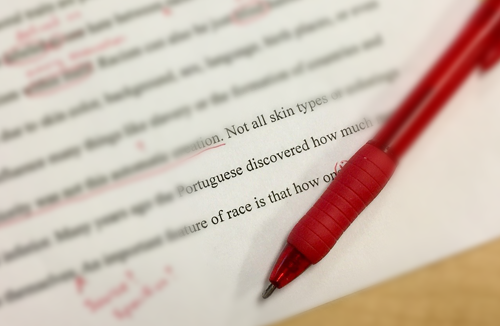
Applying What I’ve Learned
This summer, I have been applying what I learned in my first year of graduate school to both my writing and my reading. That might be obvious but in my case I am satisfied to know it hasn’t gone in one ear and out the other. In my reading, I feel like a ghost hovering above the page, seeing the big picture. In my writing, I see myself as field marshal issuing strategic orders to my words and thoughts. And now I am out of similes.
If someone were to ask me, “why do creative people need grad school?” I would repeat what I’m writing here: Grad school gives you a profound way of thinking about your art and it gives you tools you would otherwise never have known existed to shape your art. Editing principles, non-narrative approaches, and leitmotifs are just a few of the new concepts in my arsenal thanks to graduate school.

A nicer pen won’t make the writing better.
Summer, a comparatively idle time for academics, has afforded me the ability to slow down and see my growth as a writer. During the semester, I could probably have recapitulated the key concepts being presented to me but only now with some distance and a slower mindset do I truly understand what I’ve learned. Better still, I see my growth as both a writer and a critical thinker.
Here’s a concrete (if simplified) example for you. I used to pride myself in saying that I wrote 1,000 words a day. These words, however, were rarely interconnected to the thousand words I’d written the day before, or the day after. There was no forward motion and no spine from which my ideas could extend or relate to one another. I wasn’t really thinking much beyond how to write a beautiful sentence.
This approach was best summed up by Aleksandar Hemon, Distinguished Writer in Residence at Columbia College Chicago. Hemon told us that this approach is “…not writing. It’s typing.” Beneath this bon mot is a wealth of practicality for the writing student. Have a clear intent in what you are writing; develop an outline (either in your head, on paper, or on your computer) based on editing principles you have established; remember that your first sentence sets up everything.

Editing is just red marks over spelling mistakes.
A related concept has been the redefinition of what editing actually means. For most of my writing life I’ve thought of editing as “polishing” work – checking for spelling and grammar mistakes, etc. But I know realize it doesn’t mean those things at all. It is much more complex: it is rearranging entire sections of text in a way that benefits the piece as a whole. It is thinking cautiously about the use of dialogue and descriptions of choreography – the inclusion of which, I’ve learned, often weaken a work.
I may no longer be writing a thousand words a day, but I am writing narrative sections of work that are well drafted and connect with the work I am producing on other days. The ultimate goal will be to make editing choices in my head and have stronger drafts to bring to workshops or to begin preparing manuscripts for submission.
